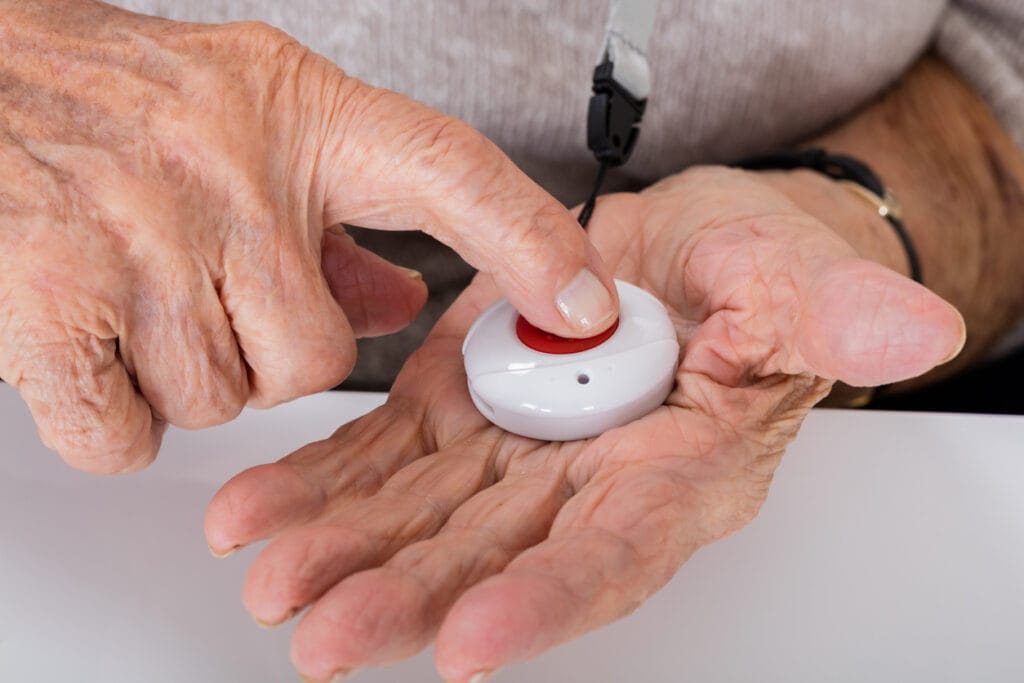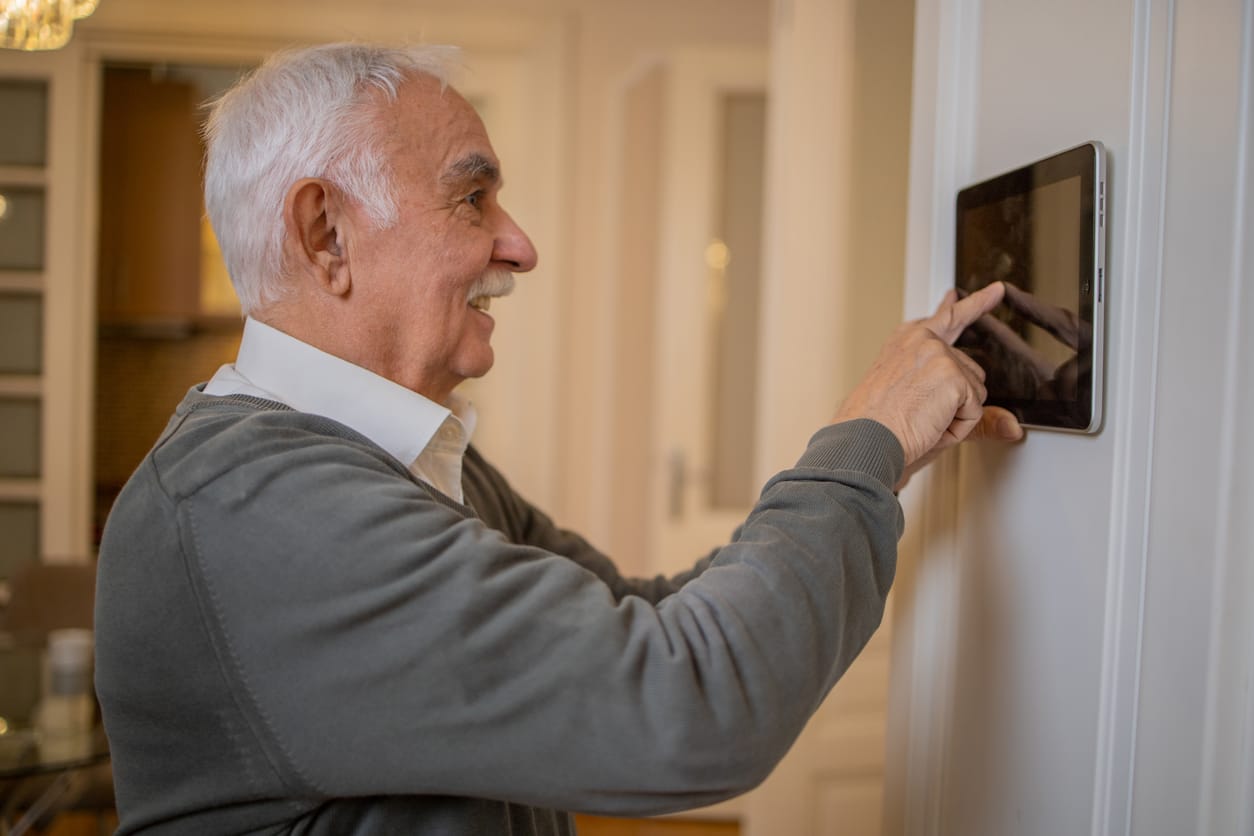Navigating the complexities of caring for elderly loved ones underscores the importance of personal safety devices tailored to seniors. These devices serve as indispensable tools, offering caregivers peace of mind and enabling them to safeguard their loved one's well-being.
These technologies are not just aids but essential companions in the caregiving journey, ensuring seniors receive prompt assistance and maintain their safety and independence effectively.
The Role of Technology in Senior Safety
Technology plays a pivotal role in enhancing the safety and independence of our senior loved ones, aligning with their strong preference to age in place. According to AARP, an overwhelming 90% of adults over 65 wish to remain in their homes for as long as possible. This desire highlights the importance of technological innovations designed to support this lifestyle.
Medical Alert Systems
Medical alert systems play a vital role in ensuring the well-being and security of elderly individuals who may live independently or require additional support. These devices are designed to provide immediate access to emergency assistance at the touch of a button, offering peace of mind to both seniors and their caregivers.

Benefits of Medical Alert Systems
- Emergency Response: Instant access to emergency services at the press of a button, crucial for rapid assistance during medical crises like heart attacks or falls.
- Peace of Mind: Provides reassurance to caregivers and family members that help is readily available for their loved ones, enhancing overall safety.
- Enhanced Independence: Enables seniors to maintain independence by allowing them to live alone confidently, knowing help can be summoned quickly.
- Customizable Features: Options such as waterproof designs for use in all conditions, extended range coverage for larger homes or outdoor spaces, and reliable connectivity via cellular or landline networks.
- Testimonials: Real-life stories, like Jane's father who was saved during a heart attack, highlight the life-saving potential of these systems, reinforcing their value.
Product Recommendations
Highly recommended medical alert systems include Alert and SafeGuard. Alert stands out for its waterproof pendants and nationwide coverage, ensuring uninterrupted service even during travel. SafeGuard offers advanced fall detection technology, automatically alerting emergency services if a fall is detected and the user is unable to respond. These features make Alert and SafeGuard reliable choices for caregivers seeking comprehensive safety solutions for their elderly loved ones.
Medical Alert Systems are one such innovation, offering immediate access to emergency services, which can significantly improve outcomes during emergencies. The National Council on Aging reports that these systems can reduce hospital readmission rates by up to 30%.
GPS Trackers
GPS trackers have emerged as indispensable tools for ensuring the safety and well-being of seniors, particularly those living with conditions like Alzheimer's or dementia. These devices utilize advanced global positioning technology to provide real-time location tracking, offering caregivers invaluable peace of mind by allowing them to monitor their loved ones' whereabouts remotely.
- Real-Time Tracking: Provides instant location updates, allowing caregivers to monitor seniors' movements accurately.
- Geofencing: Sets virtual boundaries and sends alerts if seniors wander outside designated safe areas, ensuring proactive safety measures.
- Ease of Use: Intuitive interfaces and simple operation make it accessible for seniors to use independently.
- Durability: Designed to withstand daily wear and varying environmental conditions, ensuring reliable performance over time.
- Battery Life: Long-lasting battery ensures continuous operation without frequent recharging, offering peace of mind to caregivers.
Review of Popular Models
Popular GPS tracker models tailored for seniors include Tracker and Locator. Tracker stands out for its user-friendly interface and robust battery life, ensuring reliable performance. Locator offers comprehensive geofencing features and real-time tracking, making it ideal for caregivers seeking proactive monitoring solutions. These models exemplify the innovation and practicality necessary for safeguarding seniors effectively with GPS technology.
Fall Detectors
Fall detectors are essential devices designed to mitigate the risks of falls among our senior loved ones, which can lead to severe injuries and complications. These devices utilize advanced sensors to detect sudden movements or changes in orientation that may indicate a fall. By triggering alerts to caregivers or emergency services promptly, fall detectors play a crucial role in ensuring swift intervention, reducing the likelihood of prolonged immobility and enhancing overall safety for seniors.
Studies indicate that these technologies can lead to a 50% reduction in in-home fall injuries, making the home environment safer for seniors.
Leading Fall Detectors on the Market
Several leading fall detectors are highly recommended for their reliability and advanced features. FallGuard integrates seamlessly into daily life with its discreet design and reliable fall detection capabilities, ensuring prompt alerts to caregivers or emergency services. PendantPlus offers robust standalone fall detection with adjustable sensitivity settings and long-lasting battery life, making it a dependable choice for focused fall prevention. These detectors exemplify innovation and effectiveness in safeguarding seniors from fall-related injuries, providing caregivers with invaluable peace of mind.
Additional Safety Devices Worth Considering
In addition to essential safety tools like medical alert systems and GPS trackers, a range of complementary devices can further enhance the safety and well-being of our elderly loved ones. These technologies work together to create a robust, multi-layered approach to senior care, offering peace of mind to both seniors and their family caregivers.
Smart Home Sensors are invaluable for monitoring daily activities. These devices, which include motion detectors and door/window sensors, can alert caregivers to unusual movements or potential emergencies. For example, if a door is left open late at night or there is a lack of movement for an extended period, the system can send an alert, prompting a quick check-in.
Emergency Response Apps are another critical tool, providing instant access to emergency services. These apps often include features that allow caregivers to manage medical information and contacts effectively, ensuring that all necessary data is readily available during an emergency.
Wearable Technology goes beyond traditional medical alert systems, incorporating health monitors and smartwatches that track vital signs and daily activities. These devices can monitor heart rate, sleep patterns, and even detect falls, enabling seniors to manage their health proactively and catch potential issues early.
How to Choose the Right Device for Your Loved One
Assess Their Individual Needs
When choosing safety devices for seniors, it's crucial to assess their specific needs and challenges. Consider factors such as their medical conditions, mobility limitations, and any cognitive impairments. For example, seniors with Alzheimer's may benefit from GPS trackers with geofencing capabilities, while those prone to falls might require medical alert systems with fall detection features.
Importance of Usability
The usability of safety devices is paramount for seniors' independence and confidence in using them. Opt for devices with intuitive interfaces and straightforward operation. Ensure they are comfortable to wear or use daily, with features like lightweight designs and ergonomic controls. Testing the device with your loved one beforehand can provide insights into its usability and suitability for their routine.
Financial Considerations
Financial planning plays a significant role in device selection. Research insurance coverage options or medical subsidies that may help offset the costs of these devices. Some insurers or healthcare providers offer coverage for medical alert systems or other safety devices, easing financial burdens. Additionally, consider long-term costs such as maintenance fees or subscription plans associated with certain devices to make informed financial decisions.





